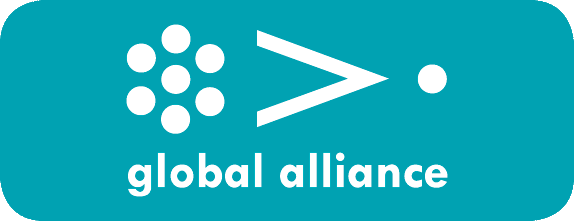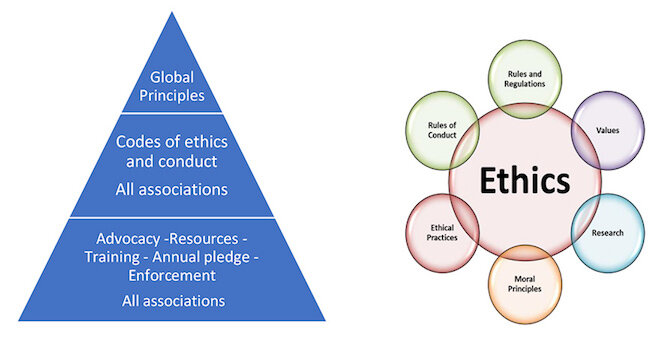Global Principles of Ethical Practice in Public Relations and Communication Management
Ethical PR
The core element of the GA Ethical PR Project is to develop a global standard in the form of a set of principles and statements for the ethical practice of public relations. The GA first adopted such a code in 2003 and updated this code in 2018. It has also engaged in a ratification process by all its member organizations - a declaration of support which certifies that the organization adheres to the code principles.
Enforcement of the Code of Ethics is left to each member organization. Many organizations prefer an 'education' rather than 'enforcement' approach. The GA assists members by facilitating the exchange of recent experiences and events. Promotion of ethics as a core value of the profession remains at the center of GA advocacy efforts.
Have a look at the Ethics Resources and Declaration of Principles.
Declaration of Principles
Global Principles of Ethical practice in Public Relations and Communication Management
For more than 70 years, public relations and communication professional bodies have established codes of ethics to help public relations and communications professionals to detect, deter and denounce unethical behaviors. Most professional bodies in public relations and communication have codes of ethics, enforce codes of practice, conduct and offer guidance for their members. Over the years, giants in our field have provided guidance on codes of ethics. We have been inspired by the work of these senior leaders from around the world in our review of codes to extract global principles.
As communicators and public relations professionals, we have the potential to influence economies and individuals. This carries obligations and responsibilities to society and to organisations. Ethics must be at the core of our activity. There is no public relations/communication profession without ethics. Membership in a professional association and adherence to a code of ethics is the ‘point of difference’ for a professional practitioner in an environment where unqualified individuals can ‘put the sign on the door’. For ethics standards to be enforced, practitioners must be members of a professional body, so they can be called to account.
The 2018 Global principles were developed following a review and comparison of over a dozen codes of conduct and codes of ethics.
As illustrated in the pyramid, the global principles are offered as global guidance to individual organisations. It does not replace codes of ethics which are enforceable by the associations.
GLOBAL PRINCIPLES OF ETHICS (2018)
Here are the 16 principles that we deem universal and fundamental to the practice of public relations and communication management:
Guiding principles
Working in the public interest
Obeying laws and respect diversity and local customs
Freedom of speech
Freedom of assembly
Freedom of media
Honesty, truth and fact-based communication
Integrity
Transparency and disclosure
Privacy
Principles of professional practice
Commitment to continuous learning and training
Avoiding conflict of interest
Advocating for the profession
Respect and fairness in dealing with publics
Expertise without guarantee of results beyond capacity
Behaviours that enhance the profession
Professional conduct
Global principles and code of ethics for professional public relations and communications practitioners (GA code 2018)
Declaration
As professional communicators and public relations professionals, we have the potential to influence economies and individuals. This carries obligations and responsibilities to society and to clients. We understand that there is a direct relationship between ethical conduct and trust which is critical to our reputation.
Guiding principles:
A profession is distinguished by certain characteristics or attributes, including:
Mastery of a particular intellectual skill through education and training
Acceptance of duties to a broader society than merely one’s organisations/employers. We accept that the balance should tip in favor of the broader public interest.
Objectivity
High standards of conduct and performance
We base our professional principles therefore on the fundamental value and dignity of the individual. We believe in and support the free exercise and respect of human rights, especially freedom of speech, freedom of assembly, and freedom of the media, which are essential to the practice of public relations and professional communication.
In serving our organisations and employers, we dedicate ourselves to building and sustaining essential relationships among those who grant our licence to operate, improving communication, understanding, and cooperation among diverse individuals, groups, and institutions of society. We also subscribe to and support equal opportunity of employment in the communication and public relations profession, and lifelong professional development.
We undertake:
To conduct ourselves professionally, with integrity, objectivity, truth, evidence-based communication, accuracy, fairness, and responsibility to our clients, our organisations, our organisations’ stakeholders and to a wider society
To improve our individual competence and advance the knowledge and proficiency of the profession through continuing education and research and, where available, through the pursuit of professional credentials or accreditation
To give consideration to the protection of privacy of individuals and respect for the spirit as well as the letter of applicable laws
To adhere to the principles of the Code of Professional Standards for the Practice of Public Relations and communication
1. PRINCIPLES OF PROFESSIONAL PRACTICE
We are committed to ethical practices, preservation of public trust, and the pursuit of communication excellence with high standards of performance, professionalism, and ethical conduct.
Advocacy. We will serve our organisations and employer and client interests by acting as responsible advocates and by providing a voice in the market place of ideas, facts, and viewpoints to aid informed public debate.
Disclosure. We will disclose any conflict of interest and offer transparency. We will be forthcoming about sponsors of causes and interests and never engage in misleading practices.
Honesty. We will adhere to the highest standards of accuracy and truth in advancing the interests of clients and employers.
Integrity. We will conduct our business with integrity and observe the principles and spirit of the Code in such a way that our own personal reputation and that of our employer/clients, and the public relations/communication profession in general is protected.
Expertise. We will encourage members to acquire and responsibly use specialized knowledge and experience to build understanding and client/employer credibility. We will not promise what we cannot deliver. Furthermore, we will actively promote and advance the profession through continued professional development, research, and education.
Loyalty. We urge members to demonstrate commitment to those they represent, while honoring their obligations to serve the interests of society and support the right of free expression.
2. PERSONAL RESPONSIBILITY
We believe it is the duty of every association and every member within that association that is party to the Code of Professional Standards to:
- Acknowledge that there is an obligation to protect and enhance the profession.
- Remain informed and educated about practices in the profession that ensure ethical conduct.
- Actively pursue personal professional development.
- Accurately define what public relations activities can and cannot accomplish and manage expectations, targets, and contracts accordingly.
- Counsel its individual members in proper ethical decision-making generally and on a case specific basis.
- Require that individual members observe the ethical recommendations and behavioral requirements of the Code.
Framework for implementation and best practices
The task force recommends that all associations who are members of this task force, or of the GA, examine the revised Global Code and make necessary adjustments within 6 months of adoption. A new Global Brand will be developed which will help associations proclaim their compliance with the revised Global Principles.
We also encourage associations to implement an annual pledge to their code of ethics. See sample which can serve as a best practice at Annex 2.
We encourage professional bodies to offer ethical decision-making guides, such as this one, for example (courtesy of PRSA):
1. Define the specific ethical issue/conflict.
2. Identify internal/external factors (e.g. legal, political, social, economic) that may influence the decision.
3. Identify key values that are in question
4. Identify the parties who will be affected by the decision and define the public relations professional’s obligation to each.
5. Select the ethical principles to guide the decision-making process.
6. Decide and justify it to all parties affected by the decision and to the public if necessary.
Enforcement of the Code of Ethics is left to each member organization. Many organizations prefer an 'education' rather than 'enforcement' approach. The GA assists members by facilitating the exchange of recent experiences and events. Promotion of ethics as a core value of the profession remains at the center of GA advocacy efforts.
GLOBAL RESOURCES IN ETHICS
For a list of global resources on ethics in public relations and communication see here.


